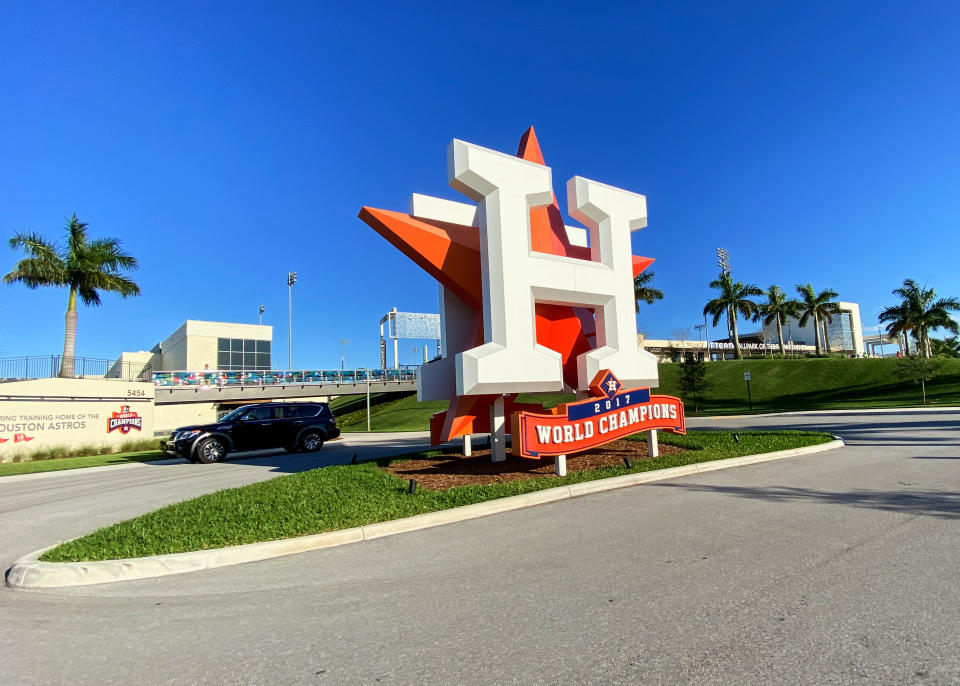How MLB is trying to limit cheating after the Astros scandal

Major League Baseball remains in crisis mode after the Houston Astros cheating scandal rocked the sport this winter. As opening day gets closer, the league is taking new steps to restore some sanctity to a game that’s been overwrought with sign-stealing allegations, conspiracy theories about other types of cheating and whether the league did enough to punish those involved.
Looking to restore some order after what is easily the biggest scandal since the steroid era and perhaps the biggest ever, MLB is now reportedly giving teams a new set of instructions about what is and isn’t allowed during the 2020 season.
“Cheating” in baseball has always been a somewhat vague term. Types of performance-enhancing drugs weren’t banned at the start of the PED era. Official rules state pitchers can’t doctor the ball, yet it happens in virtually every game during the season and players rarely get punished. The most famous example is Michael Pineda getting suspended for excessively lathering pine tar on his neck.
Baseball operates a bit like speeding on the highway — there’s an understood flexibility with the rules, but if you take it too far, you’re probably getting pulled over. Now, MLB is trying to rein in some areas where teams and players have either gotten too comfortable or pushed the boundaries too far.
Per Tom Verducci at Sports Illustrated, none of these rules are final. The league is still working with the players union to have an agreement by opening day. But this is what is currently being communicated to teams in their pre-season meetings with MLB officials.
• New limits on clubhouse/dugout access: The Astros saga partially stems from having too many people with access to the clubhouse and dugout. Under MLB’s proposed plan, only players, seven coaches and necessary interpreters and trainers will be allowed. This would crack down on access to front-office personnel, which was an issue with the Astros, as staff would set up in video rooms with laptops. In Houston’s specific example, it’s how they compiled the data for their Codebreaker algorithm. According to SI, this would be “seriously policed” by MLB.
• Limiting TV/phone use during games: This one is still in the works, but there will be some sort of rule, Verducci writes, about how much access players have to clubhouse TVs and their phones. It could be anywhere from a complete ban to having TVs on an eight-second delay. This would also limit non-cheating activities like players on the bench retreating to the clubhouse to use their phones or play video games, which was an area of frustration in Philadelphia recently.
• Ban “engineered” substances to doctor ball: We’ve heard that MLB will crack down on doctoring the ball with foreign substances, which seems like a necessary step as to not be hypocritical toward cheating. Specifically, the league wants to ban “engineered” substances, according to Verducci. Put simply, if pitchers are going to use a reasonable amount of pine tar or a mixture of resin and sunscreen (this is the most common thing pitchers do), that’s still OK as long as it’s not excessive. But the league will be cracking down on “engineered” substances. According to SI, the league is going after substances that “go beyond providing a grip to specifically and intentionally affect ball flight for a competitive advantage.” Really, they’re talking about substances that pitchers use to increase the spin rate on their pitches. Some teams reportedly use so-called “performance-enhancing” recipes.
This is another area where the Astros have long been accused of pushing the limits. Reds pitcher Trevor Bauer had specifically called out the Astros pitchers for going beyond the norm to increase their spin rate.
Brent Strom, Houston’s pitching coach, addressed that in Verducci’s story, saying:
“The pine tar rag was right there for anybody. We have no formulas or anything like that. Firm Grip was used. Pine tar was used. Not a [recipe such as] ‘30 percent resin, 22 percent pine tar …’
“Our organization never went to an outside chemist. Never went to get like certain percentages of sticky stuff. Pine tar was used? Yes. It was used, okay? It’s been used for the last 50 years and hitters don’t complain. If you hang a 28 [hundred] revolution curveball as opposed to a 26 they’re going to hit it anyway ... The thing we need to be cognizant of is it can’t be Pineda-like. When I watch major league pitchers I know are using it, I can’t tell where they get it. And there’s others that it’s so blatant it’s ridiculous.”
There’s not much talk of punishments, which is what many fans seem concerned about after the Astros scandal.
What happens when players cheat again? Will they themselves be punished this time? Or will it, again, be contained to managers, GMs and executives?
Answers to those seem like a necessary component to restoring order to baseball.
More from Yahoo Sports:

 Yahoo Finance
Yahoo Finance 